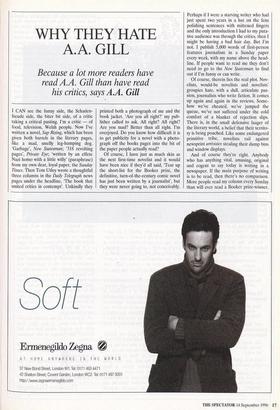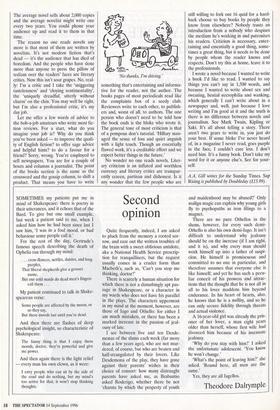WHY THEY HATE A.A. GILL
Because a lot more readers have read A.A. Gill than have read his critics, says A.A. Gill I CAN see the funny side, the Schaden- freude side, the biter bit side, of a critic taking a critical pasting. I'm a critic — of food, television, Welsh people. Now I've written a novel, Sap Rising, which has been given both barrels in the literary pages, like a mad, smelly leg-humping dog. 'Garbage', New Statesman; '318 revolting pages', Private Eye; 'written by an effete Nazi homo with a little willy' (paraphrase) from my own dear, loyal paper, the Sunday Times. Then Tom Utley wrote a thoughtful three columns in the Daily Telegraph news pages under the headline, 'The book that united critics in contempt'. Unkindly they
printed both a photograph of me and the book jacket. 'Are you all right?' my pub- lisher called to ask. All right? All right? Are you mad? Better than all right. I'm overjoyed. Do you know how difficult it is to get publicity for a novel with a photo- graph off the books pages into the bit of the paper people actually read?
Of course, I have just as much skin as the next first-time novelist and it would have been nice if they'd all said, 'Tear up the short-list for the Booker prize, the definitive, turn-of-the-century comic novel has just been written by a journalist', but they were never going to, not conceivably.
Perhaps if I were a starving writer who had just spent two years in a but on the fens polishing sentences with mittened fingers and the only introduction I had to my puta- five audience was through the critics, then I might be having a bad hair day. But I'm not. I publish 5,000 words of first-person features journalism in a Sunday paper every week, with my name above the head- line. If people want to read me they don't need to go to the New Statesman to find out if I'm funny or can write.
Of course, therein lies the real plot. Nov- elists, would-be novelists and novelists' groupies hate, with a dull, articulate pas- sion, journalists who write fiction. It comes up again and again in the reviews. Some- how we've cheated, we've jumped the queue, we've not suffered under the cold comfort of a blanket of rejection slips. There is, in the small defensive laager of the literary world, a belief that their territo- ry is being poached. Like some endangered primitive tribe, novelists rail against newsprint arrivistes stealing their dump bins and window displays.
And of course they're right. Anybody who has anything vital, amusing, original and cogent to say today is writing in a newspaper. If the main purpose of writing is to be read, then there's no comparison. More people read my column every Sunday than will ever read a Booker prize-winner. The average novel sells about 2,000 copies and the average novelist might write one every two years. You could phone your audience up and read it to them in that time.
The reason no one reads novels any more is that most of them are written by novelists. It's not modern fiction that's dead — it's the audience that has died of boredom. And the people who have done more than anyone to press the pillow of tedium over the readers' faces are literary critics. Now this isn't sour grapes. No, real- ly: I'm a critic and I take the 'sniggering tastelessness' and 'cloying sentimentality', the `uniquely dreadful, utterly without charm' on the chin. You may well be right, but I'm also a professional critic, it's my day job.
Let me offer a few words of advice to the bob-a-job amateurs who write most fic- tion reviews. For a start, what do you imagine your job is? Why do you think you've been asked — to improve the quali- ty of English fiction? to offer sage advice and helpful hints? to do a favour for a friend? Sorry, wrong. You're employed to sell newspapers. You are for a couple of hours and columns a journalist. The point of the books section is the same as the crossword and the gossip column, to shift a product. That means you have to write No thanks, I'm driving.'
something that's entertaining and informa- tive for the reader, not the author. The books pages of most periodicals read like the complaints box of a seedy club. Reviewers write to each other, to publish- ers and, worst of all, to authors. The one person who doesn't need to be told how the book ends is the bloke who wrote it. The general tone of most criticism is that of a pompous don's tutorial. `Hillary man- aged the sense of loss and quiet anguish with a light touch. Though an essentially flawed work, it's a creditable effort and we expect better things in the future.'
No wonder no one reads novels. Liter- ary criticism is an inflated and worthless currency and literary critics are transpar- ently craven, partisan and dishonest. Is it any wonder that the few people who are still willing to fork out 16 quid for a hard- back choose to buy books by people they know from elsewhere? Nobody trusts an introduction from a nobody who despises the medium he's working in and patronises his readers. Criticism is necessary, enter- taining and essentially a good thing, some- times a great thing, but it needs to be done by people whom the reader knows and respects. Don't try this at home, leave it to the professionals.
I wrote a novel because I wanted to write a book I'd like to read. I wanted to say things you can't say in 1,500 words, and because I wanted to write about sex and swearing, bestial necrophilia and wanking, which generally I can't write about in a newspaper and, well, just because I love writing and I'm good at it and the truth is there is no difference between novels and journalism. See Mark Twain, Kipling or Saki. It's all about telling a story. There aren't two gears to write in, you just do your best. If some bloke I've never heard of, in a magazine I never read, goes purple in the face, I couldn't care less. I don't need him. It's a funny book. Don't take my word for it or anyone else's. See for your- self.
A.A. Gill writes for the Sunday Times. Sap Rising is published by Doubleday (115.99).



































































 Previous page
Previous page